When you first entertain the idea of full time RV living, your mind may whirl with romanticized images of starlit skies and the gentle lullabies of nature’s nocturnal symphony.
Living in a camper, though, is much more than these fleeting scenes; it’s an adventure with its own unique rhythm, a lifestyle change that promises both exhilarating freedom and the demands of minimalistic living.
As you embark on this venture, expect a life less ordinary, marked by the landscapes you visit and dictated by the changing seasons. Nature won’t just be a view from your window—it becomes a constant companion, sometimes unpredictable and at other times the source of profound peace. The compactness of your camper forces a simplicity upon your life, making you more conscious of your possessions and the space they occupy.
But it’s not all roughing it out in the wild. Modern campers come equipped with many of the amenities of a brick-and-mortar home—but on wheels. From cozy sleeping quarters to compact kitchens, your living space, though small, can offer remarkable comfort and efficiency. Full time RV living has never been more comfortable than it is today.
Yet, it’s crucial to be aware that your new mobile abode requires maintenance quite unlike a traditional home. Things like securing a steady water supply, managing waste, and ensuring a constant power source can transform into arduous tasks if you’re not prepared. It’s a balance, one that often has me waking up to the sun rising over mountain peaks one morning and figuring out where to fill up my water tanks the next.
Unless you’re always staying in an RV park with full hook ups, then you’ll have to figure out off-grid solutions for reliable internet, water, and power.
My entry into camper living was a cocktail of wonder and learning curves.
I advise first-timers to embrace this lifestyle with open arms and an open mind. There’s no denying the occasional pangs of nostalgia for a more grounded existence, and yet, the allure of the open road, the richness of encounters with fellow campers and locals, and the tranquility found in nature’s embrace—these are the moments that have kept me profoundly hooked to this whimsical lifestyle.
While the solo life had a steep learning curve when it came to dealing with loneliness, the full-time RV lifestyle has brought me in a space to be more comfortable with myself and my surroundings.
So, as you venture into the realm of camper living, remember that readiness is your best friend, and flexibility your amiable guide.
Prepare to be enchanted, occasionally challenged, and infinitely rewarded with your full time RV adventure.
Regardless of if you have a new RV camper or plan on dirtbagging it from a hatchback, welcome to your new home on wheels—let the journey unfold!
Choosing the Right Camper for You
Living a life of adventure on four wheels is quite the exhilarating choice, and selecting the right camper is pivotal to ensuring the journey is as smooth as the open road can be.
For me, the journey to finding my ideal home-on-the-go was much like trying on a pair of shoes — it had to be the perfect fit to make each step comfortable. (I ended up with a box truck conversion for safety and the ability to have a large space).
Now, when it comes to choosing your mobile abode, size does matter, but not in the way you might think. It’s not merely about going big or going home; rather, it’s about aligning your choice with your travel style.
Are you a lone wolf or a leader of the pack?
A snug camper for solo trips or a spacious RV for family escapades might be your calling.
A van can be a great low-cst option if you are not seeking a ton of space and want to save on gas milage. Before you rush off and buy a Sprinter van, there are many things to consider when choosing the best van to convert to a camper van.
Think about what amenities are non-negotiable for you. For some, a compact kitchenette will suffice, while others might fancy a full-sized fridge to indulge in local produce. During my escapades, I’ve learned that comfort in a camper is not necessarily about space, but about thoughtful conveniences — from a cozy sleeping area to storage that makes sense.
Budget will undoubtedly steer your decision for full time RV life. It’s key to remember that the initial price tag follows you on the road, with bigger models hogging more gas and demanding higher maintenance costs.
Be wise with your wallet when full time RVing — an affordable travel companion leaves more room for those impromptu excursions that truly enrich the soul.
Furthermore, the versatility of your camper influences where you can set your sights. Can it twist through tight country bends or navigate the nooks and crannies of hidden campsites? My trusty ride taught me that flexibility equates to freedom when the world is your backyard.
The search for the right camper is a personal pilgrimage. Delve into the details, from sleeping configurations to the ease of setup. Trust me, when you first lay eyes on ‘the one,’ it’ll feel like the beginning of a beautiful friendship — one that promises a ticket to uncharted breakfast views and the sweet freedom only the open road can offer.
Essential Supplies for Your Camper Adventure
Before embarking on your camper journey, it’s crucial to pack wisely to ensure you’re prepared for the adventure that lies ahead. Crucial supplies not only make your experience smoother, but they bring the comforts of home on the road with you.
Firstly, think about your kitchen needs. A compact set of utensils, pots, and pans is necessary, as is a small set of dishes and cleaning supplies. I always recommend carrying a portable stove – it’s been a game changer for my travels. Don’t forget a cooler or a mini-fridge to keep your perishables fresh.
Next up, we have bedding and clothing. Space is at a premium, so choose versatile layers that can keep you comfy from chilly nights to sunny days. Bring weather-appropriate bedding, and remember, a good night’s sleep is essential for the next day’s adventure.
Safety and tools cannot be overlooked. Imagine this: you’re in a serene location, and suddenly, you need to fix a leak or patch up a tire. That’s where your basic tool kit, first-aid supplies, and an emergency road kit come in handy. Include a fire extinguisher, too – safety first!
Don’t forget the electronics. A reliable GPS will ensure you’re never lost, and a solar charger can keep your devices powered up. Nothing beats having your favorite tunes or a helpful app at the tip of your fingers while surrounded by nature.
What about power? If you plan on boondocking outside of RV parks, then you should consider some solar panels or a generator to keep your electronics running.
Lastly, personal items. Bring along your toiletries, medications, and any other daily essentials that will keep you feeling fresh and at ease.
During one particularly memorable stint through the Rockies, I realized that it’s the tiny comforts – that travel mug that keeps coffee warm for hours, or the LED lantern that turns anywhere into a cozy nook – that transform camper living from a trip into a lifestyle.
In essence, think utility and comfort when packing. You’ll thank yourself later when you’re sipping that perfect cup of joe as the dawn breaks over a stunning vista, all from the comfort of your perfectly prepped camper.
Setting Up Your Camper: A Step-by-Step Guide
If you’ve ever gazed at a camper and imagined the freedom of the open road, you know there’s a certain magic to it. Arguably, one of the most enchanting moments is setting up your camper for the very first time—a process tantamount to personalizing a new home, albeit on a miniature, mobile scale.
Let’s walk through the essentials of securing your movable abode, shall we?
First off, upon arriving at your chosen slice of paradise, level ground is your friend. It’s imperative to park your camper on as flat a surface as possible. Deploy leveling blocks if the terrain demands it. Think of it as giving your mobile home a solid pair of shoes – it’s all about balance and stability.
Now that you’re parked, it’s time to extend those stabilizing jacks, affirming that your camper won’t wobble as you move about inside. Consider these jacks as the roots that temporarily anchor you to the earth, offering a semblance of groundedness no matter where you wander.
Next up, let’s talk hook-ups. If you’re at a campsite with amenities, culinary and cleanliness endeavors necessitate water and power hookups. The act of connecting your camper to these life-giving resources feels rather fulfilling, not merely a chore. Securely attach the water hose and power line, and suddenly, your little enclave is humming with the energy of a tiny house on wheels.
Now, the interior beckons. Here is where ‘setting up’ transforms into an act of personal curation. Unfold the furniture, fluff the bedding, and stow your essentials. Create a flow in your compact space that eases daily activities, from the simple brewing of morning coffee to the snug retreat of night-time reading.
Lastly, let’s talk preparations for departure. Your camper is your turtle shell – home is wherever you park it. But every setting up is complemented by a breakdown. Embrace the routine of disconnecting, retracting, securing, and storing all components. These are the rituals that string together the mosaic of destinations to come.
Always remember, setting up your camper is more than a checklist—it’s the gateway to your nomadic symphony, the prelude to your adventure’s melody. And I, for one, can’t help but be enthralled by the promise of what lies ahead with each setup and breakdown. Happy travels!
Tips for Safe Towing and Transportation
Embarking on a camper journey is not just about where you travel, but also about ensuring that your trusty steed – your camper – gets you there safely.
I remember the first time I hitched my camper to my truck; it was like starting a new chapter in a book full of adventures. To share this kind of joy without the mishaps, I’ve gathered some crucial pointers for safe towing and transportation that can turn anyone into a confident road navigator.
First up, it’s essential to get familiar with your towing setup. Whether you have a small teardrop trailer or a robust fifth-wheel, the hitch system is your lifeline. You need to check the tow rating of your vehicle – trying to pull too much weight can be like waiting for a hiccup in your journey; it’s not a matter of if, but when.
When connecting your camper, always ensure the brake lights, turn signals, and taillights are in sync with your vehicle. Think of it as a dance: your lights need to waltz smoothly with your turns and stops, signaling your moves to your fellow dance partners on the road.
Now let’s talk about the art of balance. Loading your camper isn’t just about fitting everything inside; it’s about maintaining harmony. Too much weight at the back and your camper may sway, which on the highway could leave you feeling more queasy than a choppy boat ride. Distribute the weight evenly, with heavier items low and towards the front of the axle.
Then, practice makes perfect or, at least, makes it much better. Before hitting the road on your grand adventure, take your camper out for a spin. Find a quiet place to reverse, turn, and even brake suddenly. This is where you’ll discover the quirks of your mobile abode – better in a controlled environment than out in the wild.
Lastly, always perform a pre-departure checklist. Tire pressure – check. Hitch secure – check. Signals working – check. A quick run-down before you set off can prevent those heart-sinking moments down the line.
So, while the road may call to you, ensure you and your camper are prepared to answer safely. It’s not just about the destination, after all, but enjoying the journey that gets you there.
How to Find the Best Campsites and Parks
Allow me to share my insights on the art of finding the best campsites and parks, a process that can transform a simple trip into a legendary adventure.
First, consider what sort of backdrop you dream of. Are you yearning for the peace of deep woodlands, the lull of a seaside sunrise, or the majesty of mountain views?
Once your ideal scenery is in mind, use online resources like ReserveAmerica or Recreation.gov. These treasure troves are fantastic for scouting out public parks and campsites. I find that setting up alerts for availability in popular spots is a pro move, especially during peak seasons.
These resources are fantastic when it comes to information on State Parks and private RV parks but many full-time RVers don’t want to pay for camping. That is where BLM land and national forest is your best friend.
My preferred app for full time RVing is the iOverlander App (in which I am no way affiliated with). It is the gold standard for living in an RV full-time while saving money without paying for campgrounds.
If you are like me, you enjoy more space and extended stays on BLM land.
For a slice of serenity away from the usual hustle, I’m fond of leveraging apps like Campendium and iOverlander. They provide insightful reviews from fellow travelers that can help you find that secluded spot, just a jaunt away from the tourist track.
State and national parks are jewels not to be overlooked. They often provide a well-balanced mix of nature’s unspoiled beauty, coupled with just enough amenities. Be mindful, though—some parks are immensely popular, so booking well in advance is your key to securing a spot. During my travels, I’ve learned that mid-week arrivals can increase your chances of getting a prime location.
Private campgrounds, too, have their allure.
Many offer full hookups and facilities that can make life on the road that much more comfortable. For those new to camper living, this can ease the transition into a nomadic lifestyle, offering a gentle blend of nature with a touch of modern convenience.
Lastly, my personal favorite, the approach of freestyle camping—finding Bureau of Land Management (BLM) areas or opting for dispersed camping within national forests, can lead to some unparalleled experiences.
There’s nothing quite like being nestled in the wild, under a canvas of stars, feeling as if you’ve discovered a corner of the world that is distinctly yours.
In wrapping up, remember that finding the right campsite is a delightful dance of timing, research, and sometimes, serendipity. So, set forth with enthusiasm, and let the road lead you to places that resonate with the adventurer within.
Mastering the Art of Campfire Cooking
The art of camper cooking is a skill that can turn a simple camping trip into a sumptuous outdoor feast.
When you’re living out of a camper, mastering this rustic culinary practice can elevate your journey from merely functional to delightfully memorable. Here’s how I’ve learned to embrace the flames and become a campfire guru, and trust me, with a pinch of patience and a sprinkle of practice, you’ll be savoring the smoky flavors of success in no time.
Firstly, choosing the right equipment is paramount. A portable grill grate can fit snugly over your fire pit or a sturdy tripod to hang a pot, providing versatility for anything from steaks to stews. I always pack a cast iron skillet – it’s the workhorse of my cookware. Its even heat distribution works wonders on an open flame.
Now, let’s talk about timing and heat management. Unlike the dial-controlled convenience of your kitchen stove, a campfire demands more intuition.
Soft coals and a bed of ash provide a consistent heat that’s ideal for most of your campfire recipes, while those hungry flames are perfect for boiling water or charring veggies to smoky perfection.
Always have a spray bottle of water handy to tame any unexpected flare-ups—trust me, it’s saved my bacon more than once!
Here are some adaptable meal ideas to kickstart your campfire repertoire:
- Skewered meats and vegetables doused in your favorite marinade
- Dutch oven classics like chili or baked beans that let flavors meld over hours
- Foil packet recipes where fish or chicken nestle with herbs and slices of lemon
- Simple pleasures like toasting bread or roasting marshmallows
Food safety is also key while camper living. Remember, keep your perishables cold until they hit the grill, and always ensure that meats are cooked to the proper internal temperature.
And lastly, campfire cooking is as much about enjoyment as it is about sustenance. Share stories with your companions as the aroma builds anticipation for the meal ahead. Soak in the warmth of the fire against a cool evening breeze.
I’ve cherished these moments and the meals that accompanied them, and I’m confident you will too. Remember, every burst of flame and every stir of the pot is part of the adventure. Bon appétit, or should I say, happy trails and tasty tails!
Water, Power, and Waste: Managing Utilities in Your Camper
Camper living: the sweet symphony of the open road, freedom at your doorstep, and the stars as your nightlight. But between sunsets and campfires lies the nitty-gritty of surviving and thriving in a confined space on wheels. We’re talking about water, power, and waste—your camper’s lifelines.
When I first embarked on this lifestyle, the learning curve felt like tackling a steep mountain trail, but in time it became a familiar and comfortable routine. Let’s dive in.
Water management is paramount. Always know the capacity of your freshwater tank and keep an eye on levels. Fill up at reputable sources to prevent any unwanted stomach souvenirs. Greywater, from sinks and showers, requires regular emptying.
And the blackwater tank? Well, no sugar-coating here: it’s the least glamorous part of camper living but equally crucial. Purchase biodegradable toilet chemicals to break down waste and always follow campsite rules for proper disposal.
Power is next. Your camper’s battery stores energy for all your electrical needs, from lighting to charging your devices.
On sunny days, solar panels become your best friend, quietly keeping you powered up. But if the sun decides to play hide and seek, a generator can be a wise backup option. Always be energy conscious—turn off lights when not in use, and maybe pick up that book instead of watching a movie.
Lastly, waste management isn’t just about personal convenience; it’s about respecting nature. I can’t stress enough the importance of leaving no trace. Setting up a comprehensive recycling system within your camper takes little space and pays dividends to Mother Earth.
Here are some more tips I’ve learned along the way:
- Regularly check for leaks and hose connections to avoid water damage or loss.
- LED lights consume less power—swap them out and save energy.
- Familiarize yourself with your camper’s specific electrical load and avoid overloading your system.
Managing these essentials is less about staying afloat and more about smooth sailing. Sure, it takes a bit of effort, but every journey worth taking does. And believe me, the rewards of camper living certainly outweigh the bit of elbow grease required to manage your rolling abode’s utilities.
Staying Connected: Internet and Cell Service on the Road
Stepping into a life where the open road is your guide and your camper is your trusty steed, you’ll quickly learn that staying connected has its own set of challenges. Embrace the openness of the wild, but remember, keeping a firm link with the rest of the world can be both comforting and necessary.
Firstly, I must stress the importance of a good data plan. Before I embarked on my own camper adventure, I learned that choosing a suitable carrier is more than just about cost—it’s about coverage. National providers tend to fare better in remote areas, which can be a comforting blanket of connectivity in the wilderness.
Now, let’s talk hardware. A trusty smartphone is your most basic tool, but when the signal begins to wane, I’ve found that having a signal booster is akin to having a secret passkey to wider coverage. They can take a feeble trickle of a signal and amplify it to usable levels, making that urgent email or comforting video call home a possibility.
Wi-Fi on the go is another matter. Many campsites offer Wi-Fi, but the reliability, as I’ve learned firsthand, varies like the weather.
Having your own mobile hotspot can be a game-changer. Picture settling into a serene lakeside spot and as the sun dips behind the trees, you’re not disconnected from the latest episode of your favorite show or the pressing news of the day.
Conversely, there are places where technology whispers faintly, barely brushing the wild frontier. In such cases, I’ve found satellite internet can bridge the gap between solitude and society, but be aware of the cost and equipment required.
And let’s not forget the simplest advice I was ever given: downloading ahead of time. Before you venture into those whispering spots of the wild, preload your maps, entertainment, and important documents.
Remember, the aim is not to tether ourselves to the digital world but to strike a balance between enjoying the untouched beauty of nature and the comfort of connection. After all, being on the road doesn’t mean you have to fall off the map—digitally speaking, that is.
Weather Wisdom: Preparing for Different Climates
Ah, weather wisdom – the savvy traveler’s secret to embracing camper living with open arms, no matter what Mother Nature decides to toss your way. When you’re rolling down the highway, with your home hitched snugly to your back, becoming a bit of a meteorologist isn’t just useful; it’s essential. Hold on to your hat (and your awning), because I’m going to share the ins and outs of getting weather-ready on your mobile adventures.
First things first, when choosing your camper, consider the four seasons and the geographic regions you plan to explore.
Whether you’re chasing the sun or the snowflakes, every camper will tell you that insulation is key. A well-insulated camper keeps you cozy during chilly mountain evenings and chilled when the desert heat turns it up a notch.
Now, during my travels, I’ve learned that technology can be a fair-weather friend. Before heading to new territories, I make sure my go-to weather apps are up to date. These nifty little tools not only offer forecasts, but they can also send you weather alerts which are quite the lifesavers, literally, when storms or severe weather are on the horizon. Yet, don’t rely solely on tech. Keep a battery-operated radio stashed somewhere – this classic gadget can be a lifeline when Wi-Fi waves goodbye.
When you’re parked in paradise, here’s a tip – always have a weather contingency plan. Know where you can hunker down if things go sideways, and keep your essentials (think important documents and survival gear) accessible. It’s not being paranoid; it’s being prepared.
And for those who love a sunny summer spot, remember that the heat can be as tricky as the cold. A reflective sunshade isn’t just an accessory; it’s your bestie when it comes to repelling those rays and keeping your mobile home from turning into an oven.
Lastly, I’ve learned that local wisdom is gold. Chat with nearby campers or park rangers. These folks have likely weathered it all and can offer the best advice on how to deal with the whims of the weather in their backyard.
So there you have it, fellow travelers. Prep for the climate, stay alert with tech, plan for unexpected guest appearances by adverse weather, and when in doubt, always seek local insight. Here’s to clear skies and favorable roads ahead! Safe travels!
Budgeting for Your Camper Lifestyle
Embracing life on the road in your cozy rolling abode, you’ll quickly recognize that savvy budgeting is as crucial as a well-tuned engine. Let’s dive into what it takes to manage your finances effectively, ensuring your camper lifestyle is as freeing as the open road ahead.
Firstly, it’s important to understand that your initial investment includes more than the camper itself. From insurance, registration, and maintenance costs, to campsite fees and gas—your wallet needs to be prepped for a variety of new expenses.
I discovered early on that it’s immensely helpful to set up a detailed budget. I list all foreseeable costs, separating them into fixed (like insurance) and variable (like entertainment) expenses. This clarity brings peace of mind and keeps me on track financially.
While some folks may view budgeting as a joy-killer, I’ve found it to be quite the opposite. Imagine the tranquility of enjoying a sunset, with nary a worry about whether you can afford the next leg of your journey.
What works for me is allocating my funds into categories, and yes, always reserving a slice for unforeseen splurges and emergencies. Because let’s face it, unexpected mishaps are part of the charm of travel.
When planning your budget, consider these:
- Campsite Costs: ‘Boondocking’ or staying at luxury RV parks will have varying price tags, so decide ahead which experience fits your budget.
- Food: Buying local and cooking your meals can be a substantial money-saver.
- Fuel: Keeping tabs on fuel consumption helps in forecasting your expenses.
- Maintenance: Regular check-ups may cost upfront, but prevent costly repairs later.
- Attractions and Activities: Prioritize your must-sees and maybes with your budget in mind.
- Connectivity: Internet and phone plans vary, and you might need to adjust to stay connected affordably.
- RV insurance: You still have to pay to keep your wheels legal and depending on the vehicle it may not be as cheap as you may think.
Lastly, don’t shudder at the thought of monitoring your spending daily. A quick nightly check helps me adjust as needed and ensures I sleep soundly, without money woes disrupting my sense of adventure. Remember, within the constraints of a budget, there’s room for tremendous freedom—a freedom that allows for full immersion in the joys of camper living.
Making Your Camper Feel Like Home
Stepping into your camper is akin to opening a book full of blank pages – it’s yours to inscribe with memories, to fill with laughter, and, most importantly, to infuse with the comforting essence of home. Initially, the compact walls might seem impersonal, but with a dash of creativity and a few personal touches, your camper will soon become a sanctuary where heartwarming coziness meets the thrill of travel.
First, consider the sensory symphony of your camper. Soft, ambient lighting can transform the space, offering a gentle reprieve from the stark fluorescence often found in these spaces. Opt for warm, LED string lights or even solar-powered lanterns which can imbue your camper with the soft glow of a sunset, no matter where you park.
Next, texture and warmth play crucial roles. A quilt or throw blanket, perhaps one that’s helmed from your family home, not only serves a practical purpose for those crisp evenings under the stars but also carries the comforting scent and touch of familiarity.
Scatter a mix of pillows, and if space allows, a small houseplant or two, to bring life and a breath of nature inside.
Now, let’s talk about the power of visuals. Hanging photographs or artwork is a surefire way to make your surroundings ‘yours’. Use magnetic frames on metallic surfaces or even opt for removable adhesive hooks that promise no damage upon removal. These can showcase snapshots of loved ones or favorite landscapes, serving as a visual embrace at the end of a day’s adventures.
Practicality should also whisper home. A dedicated space for your hobbies, be it a collapsible easel for the budding artist or a compact, fold-away shelf for the voracious reader, tailors the environment to your passions, ensuring that ‘living small’ never equates to living with less.
Give it a personal touch because it is now your new home!
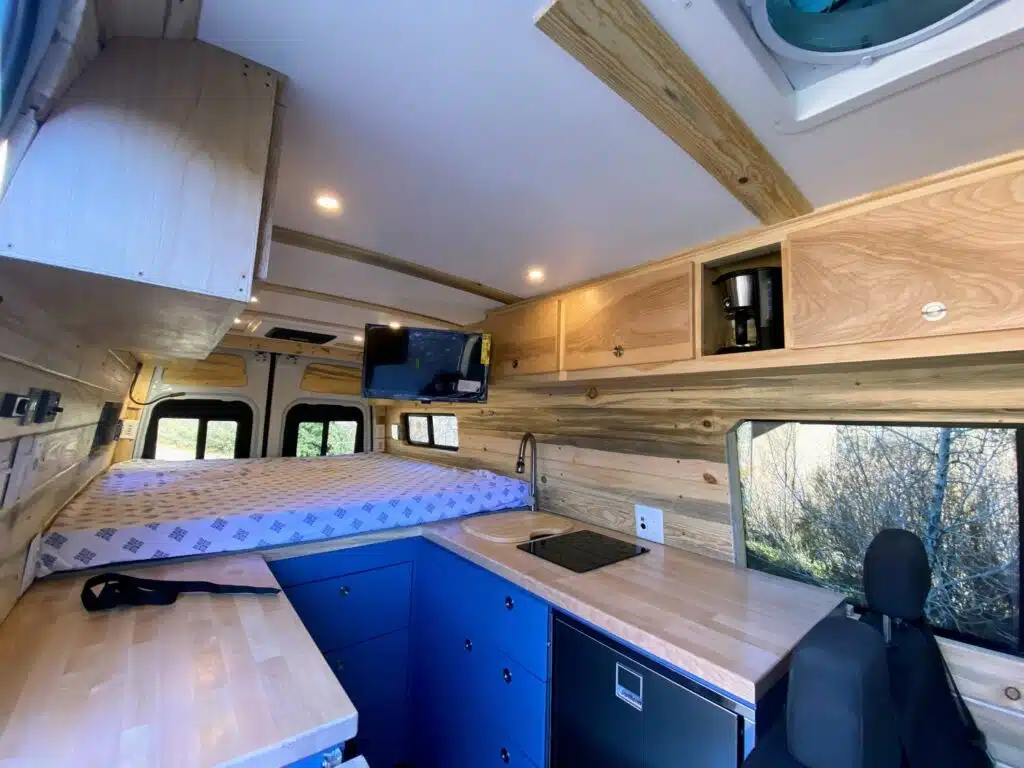
177 Sprinter Build @ https://wanderfulwheels.com/
Dealing with Wildlife and Staying Safe Outdoors
As I settled into my very first evening under the vast, star-speckled sky, tucked away in my cozy camper, I was acutely aware of the symphony of nature’s nightlife.
The rustle of leaves and the distant hoot of an owl were reminders that while I was an eager traveler, I was also a guest in the home of a diverse array of wildlife. This brings us to a critical aspect of camper living: interacting with Mother Nature’s creatures while ensuring the safety of both parties.
Dealing with wildlife while you make your home on wheels involves a blend of respect, preparedness, and caution. Firstly, researching the common wildlife in the areas you’ll be visiting is more than a fun pastime; it’s essential. Knowing if you’re sharing your temporary backyard with bears, coyotes, or simply raccoons shapes the precautions you’ll take.
Here are some simple, universal tips to steer you towards a safe and harmonious existence with your furry (or scaly) neighbors:
- Store food securely: Animals have keen noses, and the scent of your delicious campfire chili can travel far. Use airtight containers and never leave food outside unattended. Campsites often provide bear-proof lockers — use them religiously if provided.
- Dispose of waste properly: Keep your campsite clean by disposing of waste in animal-proof bins. Remember, your leftovers can be a treat for wildlife, but feeding them (even unintentionally) disrupts their natural foraging habits.
- Be wise about wildlife encounters: If you do encounter a wild animal, keep your distance. Trying to get a close-up photo or a ‘better look’ can lead to danger. Invest in a good pair of binoculars for safe viewing.
- Learn about deterrents: Depending on where you’re headed, it might be wise to carry bear spray, know how to use noise as a deterrent, or even have certain wildlife bells. However, always remember that these are precautions, not invitations to provoke or approach wildlife.
- Keep a clean ship: Beyond food, items like toiletries and trash can entice animals. Make sure everything with a scent is stored away and not left out to invite curious visitors.
By respecting these uncomplicated yet vital steps, your adventure can continue with stories of the majestic elk you spied at dawn rather than the pesky raccoon that ran away with your snacks. As a travel enthusiast, I treasure these encounters — from a responsible distance — reminding me that I’m not just an observer but a participant in the grand tapestry of our natural world.
The Camper Community: Making Friends and Learning the Ropes
There is nothing else like the camper community. As a seasoned traveler who’s seen the warm embrace of this unique society, let me tell you, it’s one of the gems of choosing a life on wheels.
When you first roll into a campsite with your home hitched to your tail, it might seem a trifle daunting. But here’s the scoop: camper folks are some of the friendliest you’ll meet.
They’re a tapestry of stories and wisdom, woven with the threads of their diverse travels. To dive into the community, start with a smile and a friendly wave. That’s your passport to this mobile neighborhood.
Next, the campfire is your communal roundtable. Imagine sharing tales under the stars with your newly-found friends – these moments become the highlights of your journey. It’s more than swapping stories; it’s about swapping expertise, recipes, and bits of advice that only come from life on the road.
Remember, every camper was once a newbie. So don’t be shy about seeking guidance. I found that a sincere question is often met with a hearty, helpful response. Whether you’re wrestling with a stubborn awning or plotting the route to your next destination, someone nearby has been there, done that, and is usually eager to help.
And learning the ropes? It’s part ritual, part education. Don’t be surprised if you see seasoned campers imparting the secrets of perfect hitching or sharing their sacred checklist for a flawless setup. Being part of this community means growing your knowledge base every day.
Finally, embracing the social aspect of camper living can be rewarding beyond measure. You might just find your next travel companion, a roadworthy recipe, or invaluable advice on managing your home-on-wheels. Remember, while the beauty of the scenery is a draw, the true splendor often lies within the bonds you create in the Camper Community.
Through sharing, caring, and the occasional marshmallow over a flame, you’ll find that this lifestyle isn’t just about places you visit, but about the human connections that guide you along the way.

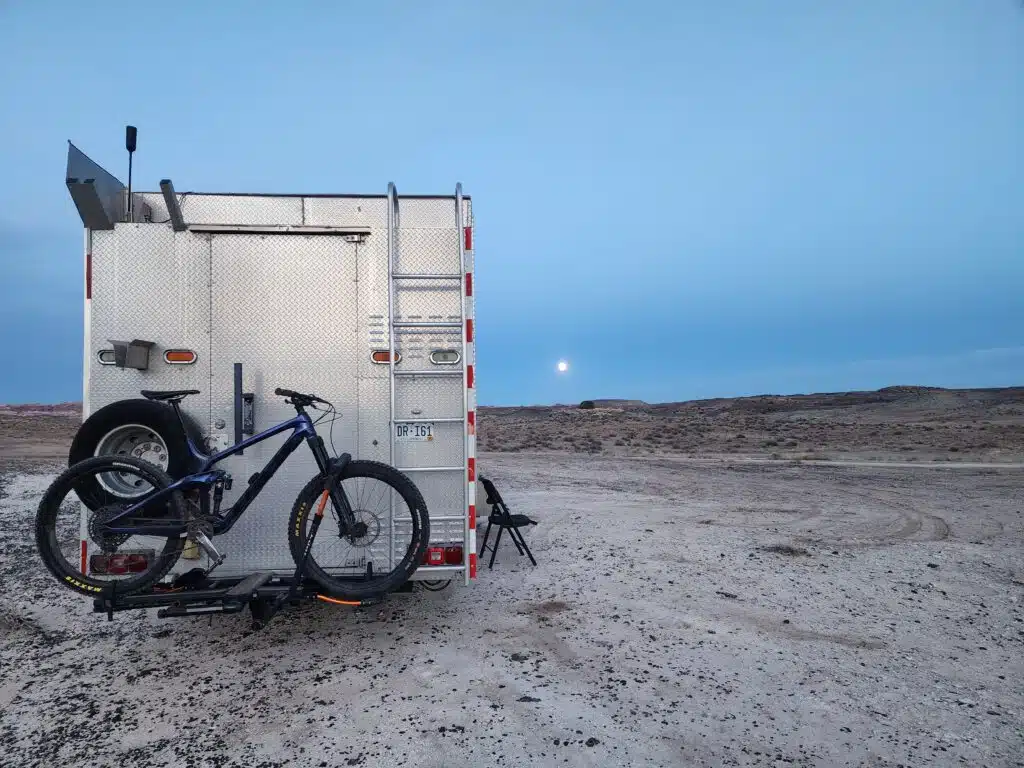
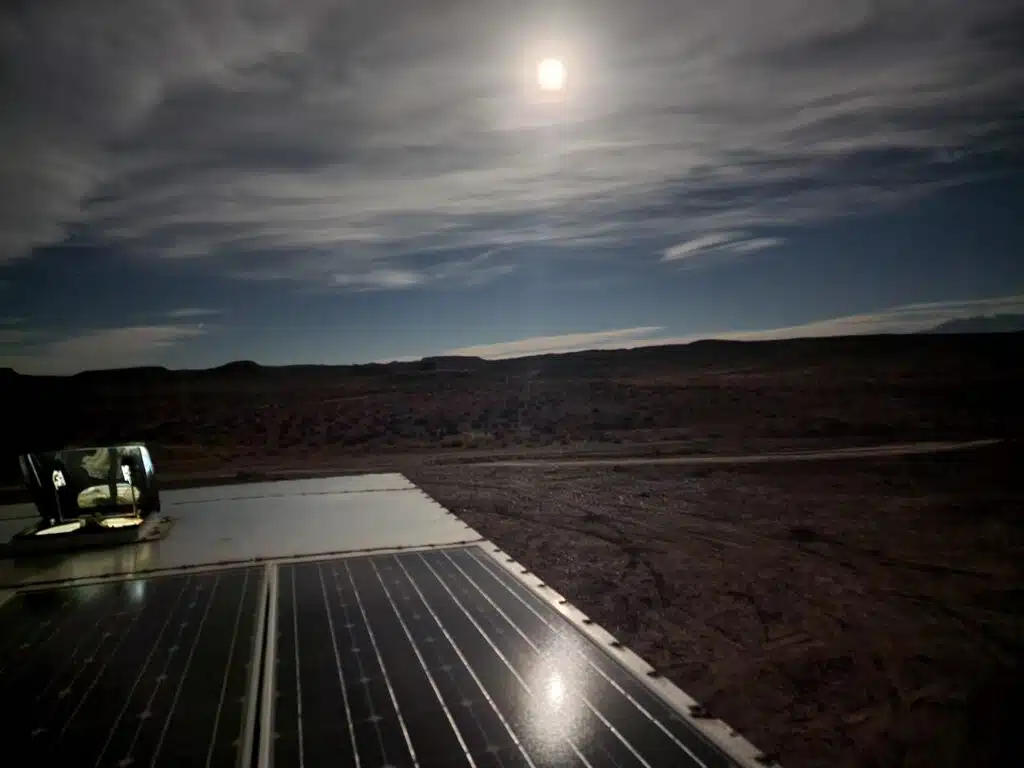
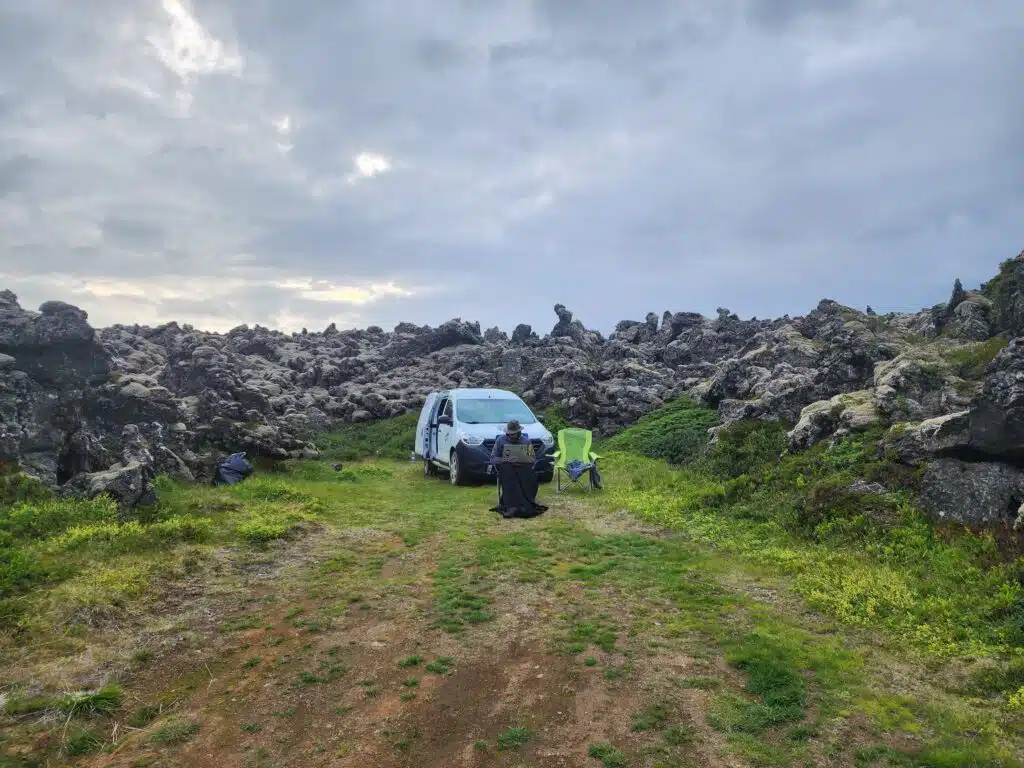
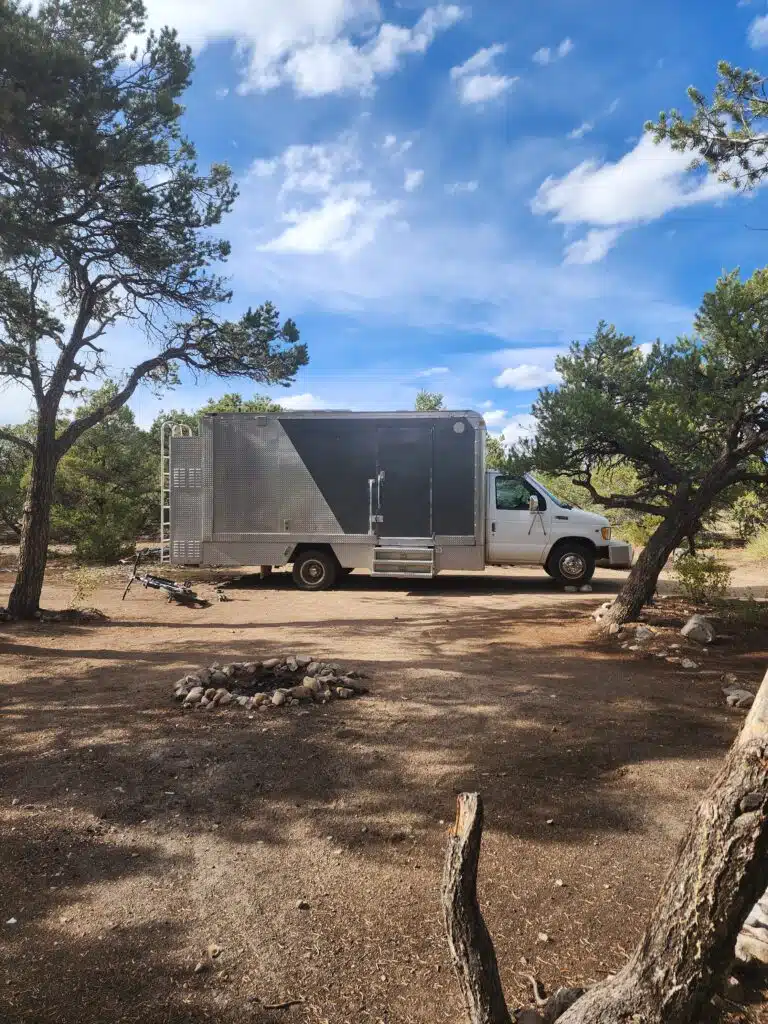
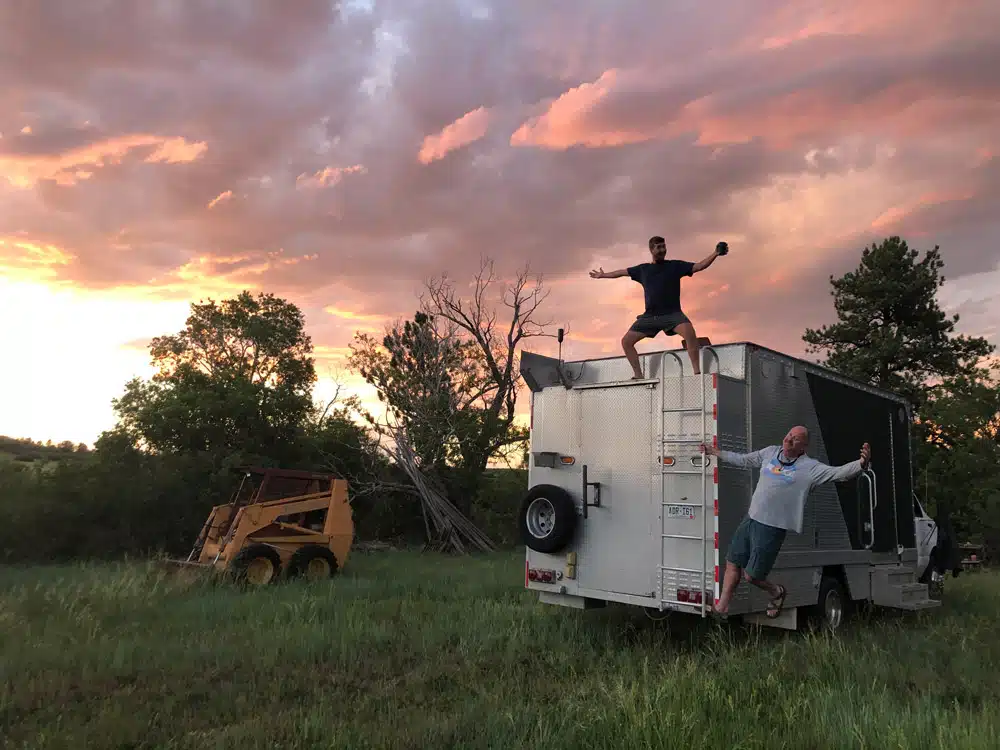
0 Comments